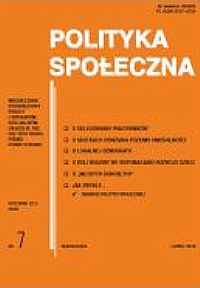
- Posting employees in European Union law. Proposed changes, assessment and threats in the regulations on the coordination of social security systems (1-8)
The article presents the current principles of posting employees based on the provisions on the coordination of social security systems. The proposed amendments to European Union regulations in this area are discussed. Assessment and threats are presented. In this assessment, the position of social partners, the competent institution and experts was taken into account.
- Being and orphanhood in the Third Republic of Poland: Social Policy Perspective (9-15)
Death is an event whose occurrence in the life of the family leads to the modification of the whole life. The last quarter-century is a period of rapid decline in the mortality rate, which in theory should reduce the likelihood of loss of relatives and lead to the subsequent occurrence of orphanhood or widowhood. The purpose of the article is to indicate - on the basis of CSO and Social Security (ZUS) data - to what extent after 1990 there is a change in the frequency of loss.
- Transformation of the age structures of the population of the Opolskie Voivodeship municipalities as a determinant for local social policies (15-24)
The change in the age structure of Poland, in particular in the Opolskie Voivodeship observed in recent years, shows a systematic increase in the share of older people with a simultaneous decrease in the share of population in the youngest age groups, which results in an aging population. Along with the transformation of the age structure, there are changes in the structure of the population's needs. Therefore, at the local level (poviats and communes), social policy is largely determined by demographic changes taking place in a given area. The local level is best suited to meet needs in a way that takes into account the local specificity, knowledge of the structure of needs and the possibilities of satisfying them. Comparison of age structures in 1999 and 2015 in communes of the Opolskie Voivodeship shows the advancement of the aging process and its spatially differentiated course. In this context, it is important and timely to undertake activities that are part of the local social policy that will secure the needs of the growing group of the oldest inhabitants of the municipalities.
- Family in the process of early support of child development (25-30)
In Poland, programs for early support of child development are implemented, the aim of which is to help disabled children and their families. It is right to believe that in the course of working with a disabled child, the family context should be taken into account, since it is the basic environment of a child's life and development. The article presents the place of the family in the process of early development support, treating it both as a recipient and as a donor of help. In both cases, the family environment is treated as an inseparable element of a sick child's life, which can not be overlooked. What's more, child development support programs that take into account the family environment turn out to be even more effective than those that assume the stimulation of the child in isolation from the family context.
- Entering adulthood in the perception of young adult Poles (31-37)
The subject of the analysis in the article is the reconstruction of the concept of entering into the adulthood of young adult Poles; their needs and expectations towards their own adulthood. The empirical basis for deliberations is the results of the research which was achieved by realizing one of the tasks under the NCN project "Public Policies for Full Adulthood in Poland", the aim of which was to reconstruct the institutional and political framework of the process of achieving adulthood in contemporary Poland. Presentation of the results is preceded by ongoing discussion on understanding the category of entering adulthood as well as tendencies and determinants of the phenomenon of achieving adulthood in contemporary societies.
- Young adults as postulated recipients of social policy (38-43)
The aim of the research described in the article was to characterize a group of young adults (persons aged 25-34) in the context of achieving full adulthood - in the field of education, work, housing conditions and starting a family, and indicating shortcomings of state actions undertaken for their benefit. As a result of the analysis of statistical data, a quantitative picture of young adults in Poland has been presented. On the other hand, the analysis of strategic and legal documents allowed to identify the actions of the state in favor of this group. This allowed for the conclusion about the lack of a harmonized in these areas and addressed directly to young adults, which may have negative consequences for population issues and the situation on the labor market.
Polityka Społeczna (Social Policy) - full list







